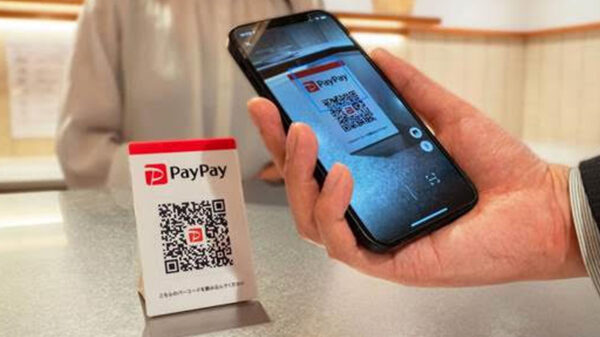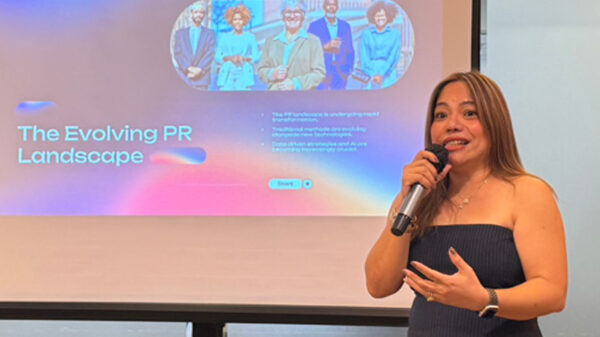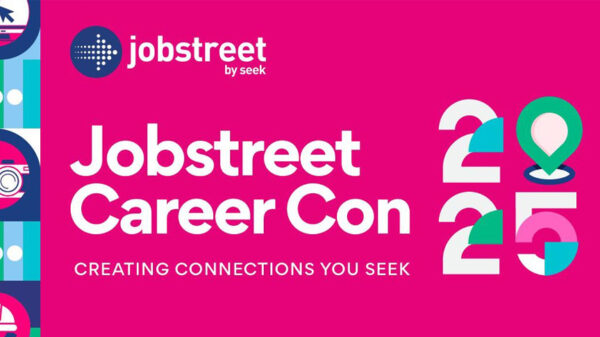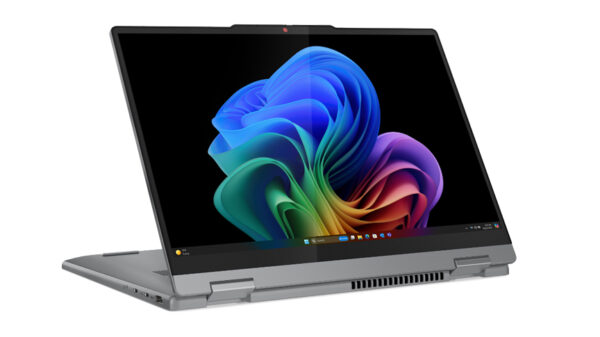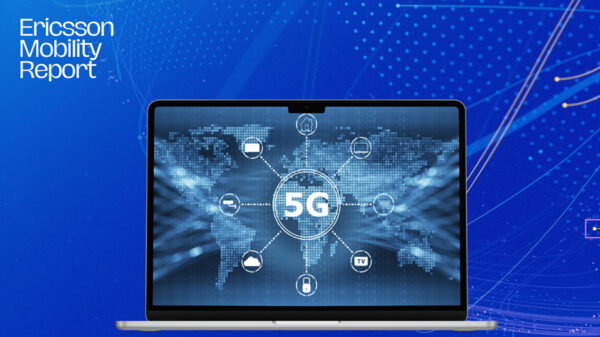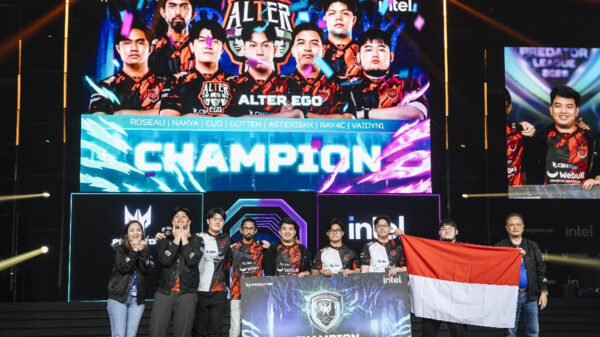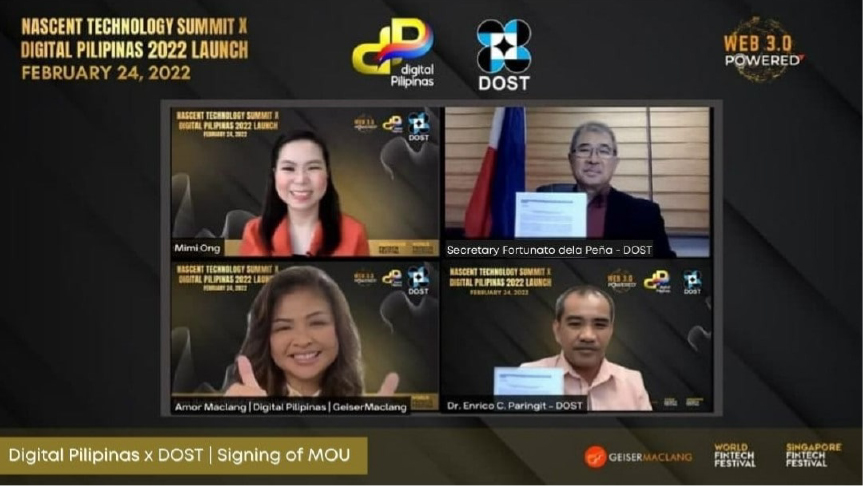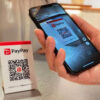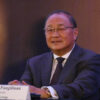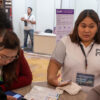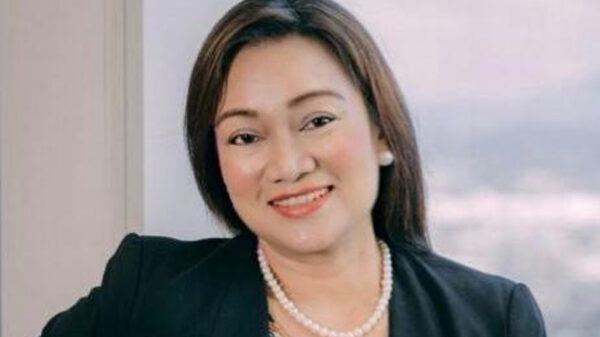Digital Pilipinas (DP), the largest private sector-led movement to create an ecosystem build for the country, inked a Memorandum of Understanding with the Department of Science and Technology (DOST) to lay out strategies in establishing university-based innovation centers across the Philippines.
The MOU, signed by DOST Secretary Fortunato dela Peña, Dr. Enrico Paringit, the executive director of the DOST- Philippine Council for Industry, Energy, and Emerging Technology Research and Development (DOST-PCIEERD), and DP Convenor Amor Maclang, highlights DP and DOST’s direction of a regional approach to innovation and technology. Sopnendu Mohanty, Chief Fintech Officer at the Monetary Authority of Singapore (MAS), witnessed the event during DP’s virtual Nascent Technology Summit.
The agreement came a month after DP sealed a tripartite collaboration with Mapúa University and the DOST-PCIEERD to launch the Think and Tinker Laboratory – Technology Business Incubation (TBI) program in promoting academe-industry-government collaboration. TBI was the pilot project for the university-based innovation centers.
“We must do more to empower problem-solving on a regional level. Problems are best solved by the people who experience those problems. That is what makes the DOST and the PCIEERD so critical,” Maclang said during the MOU signing, highlighting the collective efforts of the government and the private sector to create policies and revenue-generating streams to support the different digital equity initiatives.
She went on to say, “They have the power to provide direction in designing the nation’s digital blueprint and eventually a digital ecosystem. We will continue to support innovation as we apply those systems to the Philippines.”
In his address, Secretary dela Peña noted that while the country has a string of fintech developments, particularly in the digital payments and logistics spaces triggered by the Covid-19 pandemic, the Philippines still lags behind its ASEAN neighbors.
“As we continue to revolutionize technology, we should keep our advancement inclusive and accessible. We thank the Digital Pilipinas, under the leadership of Ms. Maclang, for the help as we reach the corners of society. We believe that the private sector is key in achieving our goals through collaboration,” Dela Peña said.
Dr. Enrico Paringit, the executive director of the DOST-Philippine Council for Industry, Energy, and Emerging Technology Research and Development (DOST-PCIEERD), is proposing an “Innovation Council” to “share meaningful discourse among movers.”
“We need to fast track the developments of innovation and technology,” Paringit said. “Digital commerce is on the rise, and some businesses thrived during the pandemic. We must also prepare the Philippines for smart technology cities where citizens have the freedom to make choices.”
Web 3.0
During the event, Mohanty discussed how the transition to Web 3.0 changed our perspective on how the world will conduct business. In addition, the shift to the so-called Internet of Trust and Internet of Money would benefit the consumers more and allow the application of emerging technologies that will create opportunities we have not thought of yet.
“As futurists and technologists, we bring a lot of new terms. The shift towards Web 3.0 is about data inclusion, and it is more consumer-based on how data will be used, the use of blockchain, and the future of money to more emerging areas,” Mohanty said.
He added that as an emerging area, “we are learning together, both private and public sector, about its potentials.”
Todd Schweitzer, co-founder and CEO of open banking technology provider Brankas, shared that the Philippines is an interesting point for Web 3.0 because, despite the number of emerging digital banks and investment opportunities in the region, a majority of adult Filipinos remain unbanked.
Estimates by the Bangko Sentral ng Pilipinas (BSP) put the number of unbanked Filipino to 70% of the adult population. This number offers opportunities to the financial sector to provide these unbanked and underserved sectors with financial services.
“Many Filipinos are unbanked,” Schweitzer said. “While some are banked, meaning they have bank accounts but are underserved. They get their salary, and they take the money out. With the growth of play-to-earn such as Axie Infinity, we see a lot of Filipinos, especially younger ones, building wealth with the use of cryptocurrencies. By providing APIs that allow the growth of these economies using blockchain technology, Web 3.0 plays a significant role in decentralizing and democratizing assets.”
Innovation centers
In January, DP, the DOST-PCIEERD, and Mapúa University signed an agreement to launch the TBI to carry out an innovation mandate to support startups in developing products and services that utilize emerging technologies while promoting innovation by providing all the necessary resources and support.
During the launch, Mapúa University President Dr. Reynaldo Vea said, “We thank the DOST for the Technology Business Incubation program. We hope to contribute to the technology commercialization significantly, and we will strive to mobilize Mapúa’s talents, not only our students but also our faculty members, researchers, graduate schools, and undergraduates to support the incubation initiative.”
The Nascent Technology Summit aims to oversee a host of emerging technologies designed to revolutionize how we interact with the world.
By teching up the country, the need to regularly use designated devices, such as mobile phones and laptops, to access the internet will be significantly reduced as the technology needed to run our lives is readily accessible in everything around us.

